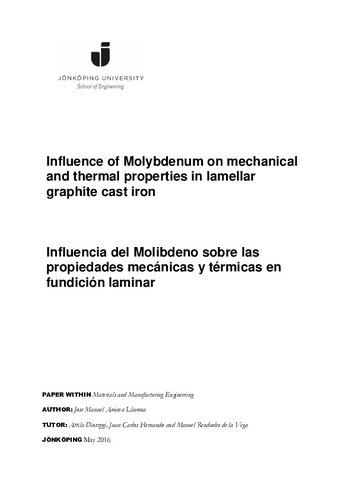Influencia del Molibdeno sobre las propiedades mecánicas y térmicas en fundición laminar
Autor(es) y otros:
Director(es):
Centro/Departamento/Otros:
Palabra(s) clave:
Lamellar cast iron, Molybdenum, Ausferrite, Solid state transformation, Ultimate tensile strain (UTS)
Fecha de publicación:
Editorial:
Jose Manuel Amieva Llavona
Serie:
Grado en Ingeniería Mecánica
Descripción física:
Resumen:
In this work hypoeutectic lamellar graphite iron alloyed with seven different levels of molybdenum was studied in order to characterize its thermal and mechanical properties. Several tests were conducted and experimental data was collected from, laser flash (LFA), differential scanning calorimeter (DSC), dilatometer and tensile test. Micrographs taken from the polished specimens were captured and studied through quantitative measurements of several parameters, e.g. graphite fraction, shape, form. Afterward, the same samples were colour etched with picric acid in order to perform a qualitative analysis of the matrix. It was concluded from the data collected, that molybdenum has a significant influence in the UTS. Such influence, increases the UTS strongly with the amount of molybdenum. It was also found that the pearlitic matrix changes into ausferrite matrix, for the 0.96% of molybdenum, but ausferrite it is detected from 0.65% of molybdenum onwards. Regarding thermal properties, molybdenum does not have noticeable effect but it is possible to see a clear worsen in the conductivity in the specimen, which has ausferrite as matrix. Graphite does not seem to have a clear behavior with the different concentration of molybdenum but in the other hand, the matrix shows clear differences as it was mention before. During solid state reaction, it was detected a clear influence of molybdenum additions, where the latent heat and the volumetric change were measured during the eutectoid reaction and show a decreasing behavior for molybdenum contents above 0.65%.
In this work hypoeutectic lamellar graphite iron alloyed with seven different levels of molybdenum was studied in order to characterize its thermal and mechanical properties. Several tests were conducted and experimental data was collected from, laser flash (LFA), differential scanning calorimeter (DSC), dilatometer and tensile test. Micrographs taken from the polished specimens were captured and studied through quantitative measurements of several parameters, e.g. graphite fraction, shape, form. Afterward, the same samples were colour etched with picric acid in order to perform a qualitative analysis of the matrix. It was concluded from the data collected, that molybdenum has a significant influence in the UTS. Such influence, increases the UTS strongly with the amount of molybdenum. It was also found that the pearlitic matrix changes into ausferrite matrix, for the 0.96% of molybdenum, but ausferrite it is detected from 0.65% of molybdenum onwards. Regarding thermal properties, molybdenum does not have noticeable effect but it is possible to see a clear worsen in the conductivity in the specimen, which has ausferrite as matrix. Graphite does not seem to have a clear behavior with the different concentration of molybdenum but in the other hand, the matrix shows clear differences as it was mention before. During solid state reaction, it was detected a clear influence of molybdenum additions, where the latent heat and the volumetric change were measured during the eutectoid reaction and show a decreasing behavior for molybdenum contents above 0.65%.
Colecciones
- Trabajos Fin de Grado [2119]
Ficheros en el ítem





